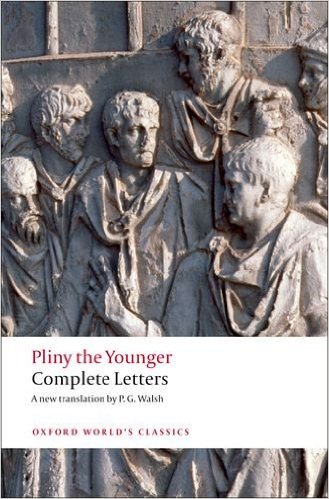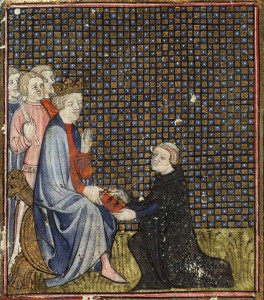
Simon de Hesdin presents his translation of the Factorum ac dictorum memorabilium libri IX or the Nine Books of Memorable Deeds and Sayings of Valerius Maximus to Charles V, king of France.
Valerius Maximus compiled a book of nearly one thousand historical anecdotes in Rome during the reign of Tiberius. Taken as a whole these stories give a sense of the values that were aspired to by the Roman upper classes in the early imperial period. For them and later Romans, Valerius’ Nine Books of Memorable Deeds and Sayings served above all as a guide on how to lead a moral life. But its shelf life long outlasted the Roman Empire, having remained popular from the early Middle Ages through the Enlightenment. In our own time his book is at best a window into the culture of a bygone civilisation and at worst a miscellanea of bloggable tales.
In the present series of posts, I intend to navigate a middle road between these two extremes in the course of acquainting the online world with his timeless work. The sheer number of stories involved necessitates an approach that is selective and probing, instead of one that might be considered comprehensive. For the latter would sooner or later degenerate into an exceptionally tedious exercise. It is with this consideration in mind that I have handpicked an assortment of anecdotes that are truly remarkable — not in the heightened sense of the word, but rather in so far as they are worthy of remark. In time I hope to accompany each of the stories listed below with a blog post. My own personal biases have weighted my selection in favour of stories that come as a shock to our modern sensibilities, stories that are genuinely puzzling or odd, stories that amuse, and above all those stories that have enjoyed a certain historical resonance down to the present day.
Unfortunately I was unable to find an English translation of the text online. The original Latin text, for those who can read it, is freely available at The Perseus Project [1]. The references below along with any quotations are taken from the Henry John Walker translation [2]. There is, however, another important contemporary translation, which I have not read, by D. R. Shackleton Bailey [3,4].
Book I: Stories about religion, false religiosity, superstitious cults, the auspices, omens, prodigies, dreams, and miracles.
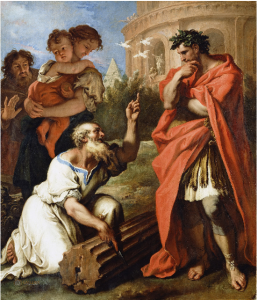
Tarquin the Elder consulting Attus Nevius the Augur by the Italian Baroque painter Sebastiano Ricci.
-
Quintus Petilius orders the burning of subversive Greek books dug up by farm-hands in a field belonging to Lucius Petilius (1.1.12).
- Gaius Terentius Varro places a handsome young actor on Jupiter’s parade float, rousing Juno’s jealous wrath in the eyes of the spectators (1.1.16).
- Dionsius I of Syracuse makes some dismissive remarks about his various acts of sacrilege (1.1.ext.3).
- Tarquin the Elder orders the augur Attius Navius to cut a whetstone with a razor, and miraculously he does so (1.4.1).
-
The Sacred Chickens of Rome (1.4.3).
Story as recorded by Julius Paris: During the First Punic War Publius Claudius wanted to fight a naval battle, and asked for the auspices in the traditional way of our forefathers. When the man in charge of the sacred chickens replied that they were not coming out of their cage, Claudius ordered them to be thrown into the sea, saying, “Since they do not want to eat, let them drink!”
- A foreseeable omen is observed when the architect Deinocrates drafts a city plan out of barley (1.4.ext.1).
- The tale of a murderous innkeeper in Megera (1.7.ext.9).
- Acilius Aviola revives on his funeral pyre (1.8.12); a man by the name of Er revives on his funeral pyre and astounds onlookers with tales of the afterlife (1.8.ext.1); Gorgias of Epirus born at his mother’s own funeral (1.8.ext.5).
- Aristomenes of Messenia is autopsied whereupon his heart is found to be full of hairs (1.8.ext.15).
Book II: Stories about ancient customs, military discipline, the right to triumph, the disapproval of the censors, and prestige.
- A man by the name of Valesius miraculously discovers a buried altar dedicated to Father Dis and Proserpina (2.4.5).
- The flute player’s guild goes on strike for the right to eat inside the temple of Jupiter (2.5.4).
Book III: Stories about human characteristics, courage, endurance, social mobility, illustrious men who led lifestyles at odds with the customs of their ancestors, self-confidence, and determination.
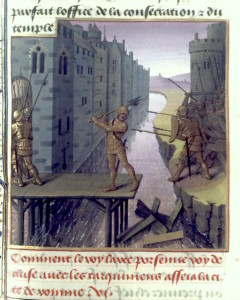
Horatius Cocles defending the Wooden Bridge by the 15th century French manuscript illuminator Maître du Boccace de Munich.
- The exploits of Horatius Cocles at the Battle of the Wooden Bridge (3.2.1).
- Mucius purposely burns his right hand to a cinder in a brazier (3.3.1); Pompeius similarly burns off his finger in a lamp (3.2.2); a boy endures the pain of a hot coal on his arm for the duration of a sacrifice conducted by Alexander the Great (3.3.ext.1); the philosopher Anaxrchus of Abdera bites off his own tongue (3.3.ext.4).
- Hannibal and Fabius the Delayer (3.8.2).
- The good-looking youth Demochares pleads with an aggressive prosecutor for leniency at his father’s trial (3.8.ext.4).
- A tense moment is passed between Alexander the Great and his physician Philip of Acarnania (3.8.ext.6).
Book IV: Stories about moderation, reconciliation, self-denial, self-control, poverty, modesty, marital love, friendship, and generosity.
- Archytas of Tarentum lets an incompetent servant go unpunished after immersing himself in philosophy of Pythagoras (4.1.ext.1).
- The tale of the golden tripod of Apollo (4.1.ext.7).
- Xenocrates resists the advances of the well-known prostitute Phryne at an all-night festival (4.3.ext.1).
- The youth Spurinna disfigures his beautiful face to prevent the people of Etruria from lusting over him (4.5.ext.1).
- Cato of Utica’s daughter Portia kills herself by swallowing hot coals (4.6.5).
- A anecdote concerning the good friends Damon and Phintias (4.7.ext.1).
- The antics of Gillias of Acragas (4.8.ext.2).
Book V: Stories about compassion, gratitude, loyalty, and parents and children.
- Syloson of Samos and his fancy cloak (5.2.ext.1).
- Pero breastfeeds her imprisoned father, Cimon (5.4.ext.1).
- The young nobleman Curtius hurls himself into gaping chasm that magically appeared in the middle of the Forum (5.6.2).
- Gaius Aelius Tubero and the woodpecker (5.6.4).
- A curious resolution is struck in a border dispute between Carthage and Cyrene (5.6.ext.4).
- The physician Erasistratus diagnoses Antiochus with being in love with his stepmother, Stratonice (5.7.ext.1).
Ancient Roman fresco depicting Micon and Pero from Pompeii. This image is by Stefano Bolognini and is distributed under a CC-BY-SA 2.0 license.
Book VI: Stories about chastity, candid behaviour, severity, dignified behaviour, justice, public trust, loyalty, and changes in character or fortunes.
- Publius Plotius has Titus Veturius flogged for refusing to engage in sexual relations with him (6.1.9).
- Gaius Vettieus cuts off his fingers to avoid military service (6.3.3).
- Cambyses skins a judge (6.3.ext. 3).
-
A New Zaleucus to Rebuke us in the Online Age (6.5.ext.4).
Nothing could be braver than the following acts of justice. Zaleucus had protected the city of Locri with the most beneficial and useful laws. His son was found guilty on the charge of adultery, and in accordance with the law that Zaleucus himself established, he should have had both his eyes gouged out. All the citizens, out of respect for the father, wanted to exempt the son from the rigours of the law, but Zaleucus resisted them for a long time. Finally, he was won over by the pleas of the people, so he gouged out one of his own eyes first, and then one of his son’s, thereby leaving each of them with the ability to see. He carried out the punishment required by his own law, but with an admirable blend of justice, he divided himself between the roles of a merciful father and a strict lawmaker.
- The tale of Polemo and Xenocrates (6.9.ext. 1).
Book VII: Stories about good fortune, wisdom, wit, stratagems, electoral defeats, necessity, and inheritance.
- The Roman priest and the Sabine cow (7.3.1).
- Alexander the Great executes a man’s ass (7.3.ext.1).
- Demosthenes defends an old woman in court pro bono (7.3.ext.5).
- Vecilius the pimp is denied his inheritance (7.7.7).
- The antics of Tuditanus (7.4.2).
Book VIII: Stories about infamous crimes, famous court cases, interrogations, witnesses, hypocrisy, enthusiasm, leisure, eloquence, erudition, professional competence, old age, the desire for glory, and prestige.
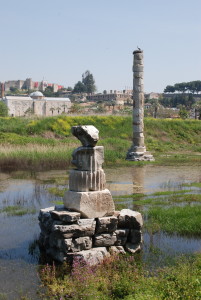
The ruins of the third Temple of Artemis in Ephesus outside Selçuk, Turkey. The first temple was destroyed in a flood, while the second was burned down by Herostratus. This image is by simonjenkins’ photos and is distributed under a CC-BY-SA 2.0 license.
- The senate takes pity on Servius Galba at his trial for the treacherous killing of a large number of Lucitanians in Spain (8.1.absol.2).
- Publius Claudius saved from conviction on charge of throwing the sacred chickens into the sea by inclement weather (8.1.absol.4).
- The vestal virgin Tuccia is acquitted on the charge of sexual immorality under miraculous circumstances (8.1.absol.5).
- Claudius of Bononia is acquitted on the charge of adultery following an embarrassing admission (8.1.absol.12).
- A man who had fallen too much in love with his boyfriend is convicted of killing a domestic ox (8.1.damn.8).
- A slave named Alexander is put to death for murdering a fellow slave; the slave everybody thought to be dead returned home a short time later (8.4.1).
- The best friends Scipio and Laelius collect seashells and pebbles at the seashore (8.8.1).
- Sulpicius Galus assuages the superstitious fears of the Roman army with a lecture on eclipses of the moon (8.11.1).
-
Apelles Paints a Horse Returning from its Exercise (8.11.ext.1).
An artist of exceptional talent had devoted a lot of work to depicting a horse that was coming back from its exercise. The painting almost looked alive. He wanted to add the foam coming from the horse’s nostrils, but this great artist was completely worn out and frustrated for a long time by this tiny task. He was burning with indignation, so he took a sponge that happened to be there beside him, soaked with all his colors, and threw it at the painting, wanting to destroy the entire work. Fortune made him aim the sponge at the horse’s nostrils, so it carried out the painter’s wishes. In this way, art did not have the power to depict something, but change imitated it successfully.
- The petty antics of Gaius Fabius (8.14.6).
- Herostratus burns down the Temple of Artemis at Ephesus (8.14.ext.5).
Book IX: Stories about hedonism, cruelty, wrath, avarice, pompous behaviour, treachery, violence, reckless behaviour, mistakes, revenge, shameless remarks, wicked deeds, unusual deaths, the desire to survive, physical resemblance, and pretenders.
- Gaius Sergius Orata: The original Jean des Essentes (9.1.1).
- Darius and the pit of ashes (9.2.ext.6).
- The brazen bull of Perillos of Athens (9.2.ext.9).
- Taxillus the gymnasium master takes revenge on some young men (9.10.ext.2).
- The unusual deaths of the poets and playwrights Aeschylus (9.12.ext.2), Homer (9.12.ext.3), Euripides (9.12.ext.4), Sophocles (9.12.ext.5), and Pindar (9.12.ext.7).
- Philemon dies from laughing at his own joke (9.12.ext.6).
- The unusual deaths of Anacreon (9.12.ext.8), Milo of Croton (9.12.ext.9), and Gnaeus Carbo (9.13.2).
- The uncanny resemblances of Vibius to Pompey the Great (9.14.1), Artemon to King Antiochus (9.14.ext.1), and a rather impertinent man to the governor of Sicily (9.14.ext.3).
References
[1] Factorvm et Dictorvm Memorabilivm, Libri Novem. by Valerius Maximus, edited by Karl Friedrich Kempf (1888). Read the original Latin text, if you can, at The Perseus Project.
[2] Valerius Maximus: Memorable Deeds and Sayings: One Thousand Tales from Ancient Rome, translated by Henry John Walker (2004).
[3] Memorable Doings and Sayings, Volume I, Books 1-5, by Valerius Maximus, edited and translated by D. R. Shackleton Bailey (2000).
[4] Memorable Doings and Sayings, Volume II, Books 6-9, by Valerius Maximus, edited and translated by D. R. Shackleton Bailey (2000).

